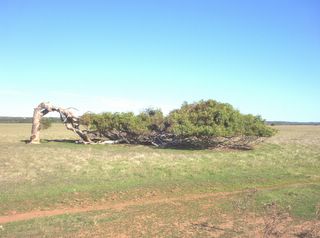https://www.theparisreview.org/literature.php/prmDecade/1970
Go to them! Brilliant line-up ... Thanks, Paris Review.
Saturday, April 30, 2005
Friday, April 29, 2005
li'l poem
She changes languages
like blouses
frilly or workplace
the clapping fingers
of her words
catch the sun
so the bucket drums
‘I learnt 6/8
in a pipe band …’
we begin in one tongue
and grow out
arterial from the mother
like blouses
frilly or workplace
the clapping fingers
of her words
catch the sun
so the bucket drums
‘I learnt 6/8
in a pipe band …’
we begin in one tongue
and grow out
arterial from the mother
Wednesday, April 27, 2005
Writing Tips
Fellow writers - Here's a selection of quotes from How To books that's a useful bunch - http://www.allenandunwin.com/writing/tips.asp
Friday, April 22, 2005

This is The Leaning Tree - a eucalypt just outside of Greenough, up the Brand Highway on your way to Geraldton in Western Australia. It is a fenced off tourist attraction,m complete with its own parking area off road and a sign saying such wonderful things as 'fragile foliage with strong limbs' ... Many trees in the area have this lean about them, but none are quite this pronounced!

Sunday, April 17, 2005
I of the Storm
out of touch
tout of ouch
out of town
tout of own
rainbow trout
rain blow out
tipple nibble
nibble nipple
oh oh oh that
bird'n'bach rag
Andrew
18 April 2005
tout of ouch
out of town
tout of own
rainbow trout
rain blow out
tipple nibble
nibble nipple
oh oh oh that
bird'n'bach rag
Andrew
18 April 2005
Friday, April 15, 2005
Text Message
Dear Colleagues,
The April issue of TEXT, and all back issues, is now freely available at
http://www.griffith.edu.au/school/art/text/
There are articles on poetics, fiction writing, how-to-write books, fictocriticsm and the role of criticism in the teaching of writing, research in the creative arts - and more!
Enjoy and please forward this email to your colleagues.
Assoc Prof. Nigel Krauth
Dr. Tess Brady
Editors, TEXT
The April issue of TEXT, and all back issues, is now freely available at
http://www.griffith.edu.au/school/art/text/
There are articles on poetics, fiction writing, how-to-write books, fictocriticsm and the role of criticism in the teaching of writing, research in the creative arts - and more!
Enjoy and please forward this email to your colleagues.
Assoc Prof. Nigel Krauth
Dr. Tess Brady
Editors, TEXT
Li'l quote I like
Well, a departure for me and this list in as much as the following quote is not about poetry, writing, cricket or films: it is just a good statement I appreciate -
There's a powerful transformative effect when you surround yourself with like-minded people. Peer pressure is a great thing when it helps you accomplish your goals instead of distracting you from them.
Po Bronson
Writer
There's a powerful transformative effect when you surround yourself with like-minded people. Peer pressure is a great thing when it helps you accomplish your goals instead of distracting you from them.
Po Bronson
Writer
Tuesday, April 12, 2005
Barbour/Creeley
Canadian poet Douglas Barbour http://www.ualberta.ca/~dbarbour/dbhome.htm always has a little quote as a footer to his emails. Often they are from Canadian poets, which is good for his home team, but right now he has this great quote from Robert Creeley - so I thought I'd share it with you:
Hand and mind
and heart one
ground to walk on,
field to plough.
Robert Creeley
Hand and mind
and heart one
ground to walk on,
field to plough.
Robert Creeley
Wednesday, April 06, 2005
2005 Ashes Tour Australian Squad
Ricky Ponting (capt), Adam Gilchrist (vc), Michael Clarke, Jason Gillespie, Brad Haddin, Matthew Hayden, Brad Hodge,Michael Kasprowicz, Simon Katich, Justin Langer, Brett Lee, Stuart MacGill, Damien Martyn, Glenn McGrath, Shaun Tait, Shane Warne.
World champions Australia versus a rejuvenated English team - This could be an interesting contest.
World champions Australia versus a rejuvenated English team - This could be an interesting contest.
Saturday, April 02, 2005
Instant Poem - Just Add Water & Serve
Wolfe Creek Crater rises out of the ground
like an overturned frisbee. They say
something landed here with an almighty
thud. The clouds were torn and shredded
like ripped paper - the kind
you make yourself at home. I stand here
on the rim, the red dirt wind
blowing in from history without
a thought. Now there is a parking area.
There are rules about when and where.
Whatever landed here had its own
rules, bullying its way past
laws of gravity and the stratosphere.
First, the act; then - rules. Signs. We
follow. John Sands may make a game
of it, Paul Kelly may write a song. The
Almighty Thud may gain a following
and gain tax exemptions cynics never
achieve. Frisbees that glow in the dark
will be sold wherever two or more
are gathered. A flock? Yes. We follow.
like an overturned frisbee. They say
something landed here with an almighty
thud. The clouds were torn and shredded
like ripped paper - the kind
you make yourself at home. I stand here
on the rim, the red dirt wind
blowing in from history without
a thought. Now there is a parking area.
There are rules about when and where.
Whatever landed here had its own
rules, bullying its way past
laws of gravity and the stratosphere.
First, the act; then - rules. Signs. We
follow. John Sands may make a game
of it, Paul Kelly may write a song. The
Almighty Thud may gain a following
and gain tax exemptions cynics never
achieve. Frisbees that glow in the dark
will be sold wherever two or more
are gathered. A flock? Yes. We follow.
Friday, April 01, 2005
Brain implant unlocks power of trapped mind
From the Melbourne Age newspaper ...
By Ian Sample
London
April 1, 2005
A severely paralysed man has become the first person to be fitted with a brain implant that allows him to control objects by thought alone.
Matthew Nagle, 25, was left paralysed from the neck down after a knife attack in 2001. He uses a wheelchair and is unable to breathe without a respirator, and doctors say he has no chance of regaining the use of his limbs.
Mr Nagle has become the first patient in a controversial trial of brain implants that could help disabled people become more independent by tapping into their brainwaves.
During a three-hour operation at the New England Sinai Hospital in Massachusetts, electrodes were attached to the surface of Mr Nagle's brain. They were positioned just above the sensory motor cortex where the neural signals for controlling arm and hand movement are produced. Surgeons completed the operation by fitting a metal socket to Mr Nagle's head so he could be hooked up to a computer.
The scientists, led by Professor John Donoghue, a world expert in neurotechnology at Brown University in Rhode Island, used a computer to decipher the brainwaves picked up by the implant. In early trials, Mr Nagle learned to move a cursor around a computer screen simply by imagining moving his arm.
By using software linked to devices around the room, Mr Nagle has since been able to think his TV on and off, change channel and alter the volume. "Eventually, we want him to be able to use it to control the lights, his phone and other devices," said Professor Donoghue.
In the most recent tests, performed earlier this year, Mr Nagle was able to use thought to open and close an artificial prosthetic hand and move a robotic arm to grab lollies from one person's hand and drop them in another. He has also sharpened his skills at computer games by playing the old arcade game Pong.
Professor Donoghue hopes the implant, called BrainGate, will ultimately allow paraplegics to regain use of their limbs.
"If we can find a way to hook this up to his own muscles, he could open and close his own hands and move his own arms," he said. "We're very encouraged by Matthew, but we're cautious. It's just one person. There's further to go, but we're absolutely on the way."
By Ian Sample
London
April 1, 2005
A severely paralysed man has become the first person to be fitted with a brain implant that allows him to control objects by thought alone.
Matthew Nagle, 25, was left paralysed from the neck down after a knife attack in 2001. He uses a wheelchair and is unable to breathe without a respirator, and doctors say he has no chance of regaining the use of his limbs.
Mr Nagle has become the first patient in a controversial trial of brain implants that could help disabled people become more independent by tapping into their brainwaves.
During a three-hour operation at the New England Sinai Hospital in Massachusetts, electrodes were attached to the surface of Mr Nagle's brain. They were positioned just above the sensory motor cortex where the neural signals for controlling arm and hand movement are produced. Surgeons completed the operation by fitting a metal socket to Mr Nagle's head so he could be hooked up to a computer.
The scientists, led by Professor John Donoghue, a world expert in neurotechnology at Brown University in Rhode Island, used a computer to decipher the brainwaves picked up by the implant. In early trials, Mr Nagle learned to move a cursor around a computer screen simply by imagining moving his arm.
By using software linked to devices around the room, Mr Nagle has since been able to think his TV on and off, change channel and alter the volume. "Eventually, we want him to be able to use it to control the lights, his phone and other devices," said Professor Donoghue.
In the most recent tests, performed earlier this year, Mr Nagle was able to use thought to open and close an artificial prosthetic hand and move a robotic arm to grab lollies from one person's hand and drop them in another. He has also sharpened his skills at computer games by playing the old arcade game Pong.
Professor Donoghue hopes the implant, called BrainGate, will ultimately allow paraplegics to regain use of their limbs.
"If we can find a way to hook this up to his own muscles, he could open and close his own hands and move his own arms," he said. "We're very encouraged by Matthew, but we're cautious. It's just one person. There's further to go, but we're absolutely on the way."
Subscribe to:
Posts (Atom)





